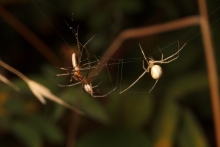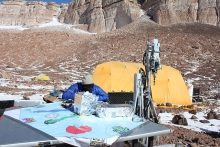

About 250 million years ago, the Permian-Triassic mass extinction killed over 80 per cent of the planet's species. In the aftermath, scientists believe that life on earth was dominated by simple species for up to 10 million years before more complex ecosystems could evolve. Now this longstanding theory is being challenged by a team of international researchers – including scientists from McGill University and Université du Québec à Montréal.
Partout au monde, l’extension des villes transforme le paysage et fragmente les écosystèmes. Selon l’écologue montréalais Andrew Gonzalez, 70% des forêts de la planète sont à moins d’un kilomètre d’activité humaine, elles sont donc interrompues par des routes, ou des villes. Ce scientifique cherche à présent le meilleur moyen pour reconnecter les forêts urbaines.

Ecosystems are a complex web of interactions. These ecological networks are being reorganized by extinctions and colonization events caused by human impacts, such as climate change and habitat destruction. In a paper published this week in Nature Ecology & Evolution, researchers from McGill University and University of British Columbia have developed a new theory to understand how complex ecological networks will reorganize in the future.

Failure to find active microbes in coldest Antarctic soils has implications for search for life on Mars
Natural Resource Sciences professor Lyle Whyte and postdoctoral fellow Jackie Goordial talk about their research which suggests that it is unlikely that it is unlikely that there is any microbial life to be found on Mars.
By Katherine Gombay, McGill Newsroom
Failure to find active microbes in coldest Antarctic soils has implications for search for life on Mars
